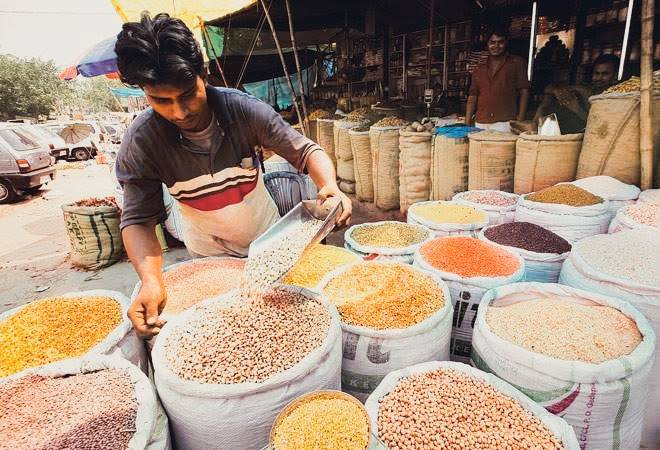
Just as prices of wheat flour are expected to ease, following scenes of chaos at wheat distribution centers, another fundamental food commodity has started to become costlier for Pakistanis suffering from wave after wave of inflation.
As the price of chicken exceeded that of beef for the first time in Pakistan's history, the prices of pulses (daal) are also on an upward trajectory, mainly due to imported consignments not being cleared at the ports, and inordinate delays by banks in approving the relevant documents.
Retail market prices of various pulses such as masoor, mung, mash and gram pulse have swelled exorbitantly. Per kilogramme prices for masoor daal increased from Rs. 210-240 in January 2022 to Rs. 270-280 now; mung daal from Rs. 180-200 to Rs. 250-300; maash daal from Rs. 260-300 to Rs. 380-400; and gram pulse from Rs. 160-200 a year ago to Rs. 230-260 per kg today. The reported retail prices may increase even more, because thousands of containers of imported pulses await clearance at the ports.
Karachi Wholesalers Grocers Association (KWGA) chairman Rauf Ibrahim said that traders gathered outside the State Bank’s head office on Thursday and protested against the non-clearance of more than 6,000 containers of pulses at the port. These containers are stuck for the past two months on account of dollar shortage and banks’ reluctance in approving import documents.
Commodity importer/exporter Faisal Anis Majeed said that the wholesale price of gram pulse had risen to Rs. 205 per kg from Rs. 180 on 1 January 2023, compared to Rs. 170 on 1 December 2022.
Majeed said that banks had stopped accepting any import documents from 1 January 2023, and also ceased payments for currently arrived cargo and other relevant documents. It may be noted that the State Bank of (SBP) earlier said it would be lifting import restrictions since that date.
Pakistan consumes approximately 1.5 million tonnes of imported pulses per annum. Majeed pointed out that the containers stuck at the ports were incurring heavy demurrage and shipping company detention charges on a daily basis. These additional costs will obviously be transferred onto the end consumers, he added.
He said traders needed to gear up imports to meet soaring demand of pulses in Ramazan. He warned a huge demand and supply gap would lead to rising prices in case pulse imports were not streamlined in time. The arrival of imported pulses takes nearly 45 to 60 days.
International suppliers are losing confidence in Pakistan and are cancelling contracts for future shipments as their current funds and products are stuck at Karachi Port, Majeed claimed as he urged the government to ensure availability of dollars for payment of pulses, and for waiver of demurrage and detention charges at the port.
As the price of chicken exceeded that of beef for the first time in Pakistan's history, the prices of pulses (daal) are also on an upward trajectory, mainly due to imported consignments not being cleared at the ports, and inordinate delays by banks in approving the relevant documents.
Retail market prices of various pulses such as masoor, mung, mash and gram pulse have swelled exorbitantly. Per kilogramme prices for masoor daal increased from Rs. 210-240 in January 2022 to Rs. 270-280 now; mung daal from Rs. 180-200 to Rs. 250-300; maash daal from Rs. 260-300 to Rs. 380-400; and gram pulse from Rs. 160-200 a year ago to Rs. 230-260 per kg today. The reported retail prices may increase even more, because thousands of containers of imported pulses await clearance at the ports.
Karachi Wholesalers Grocers Association (KWGA) chairman Rauf Ibrahim said that traders gathered outside the State Bank’s head office on Thursday and protested against the non-clearance of more than 6,000 containers of pulses at the port. These containers are stuck for the past two months on account of dollar shortage and banks’ reluctance in approving import documents.
Commodity importer/exporter Faisal Anis Majeed said that the wholesale price of gram pulse had risen to Rs. 205 per kg from Rs. 180 on 1 January 2023, compared to Rs. 170 on 1 December 2022.
Majeed said that banks had stopped accepting any import documents from 1 January 2023, and also ceased payments for currently arrived cargo and other relevant documents. It may be noted that the State Bank of (SBP) earlier said it would be lifting import restrictions since that date.
Pakistan consumes approximately 1.5 million tonnes of imported pulses per annum. Majeed pointed out that the containers stuck at the ports were incurring heavy demurrage and shipping company detention charges on a daily basis. These additional costs will obviously be transferred onto the end consumers, he added.
He said traders needed to gear up imports to meet soaring demand of pulses in Ramazan. He warned a huge demand and supply gap would lead to rising prices in case pulse imports were not streamlined in time. The arrival of imported pulses takes nearly 45 to 60 days.
International suppliers are losing confidence in Pakistan and are cancelling contracts for future shipments as their current funds and products are stuck at Karachi Port, Majeed claimed as he urged the government to ensure availability of dollars for payment of pulses, and for waiver of demurrage and detention charges at the port.

